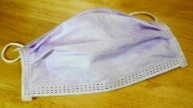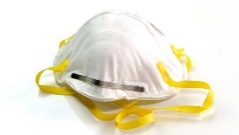Daily COVID-19 Briefing March 31, 2020
United Church of Christ – Wider Church Ministries
Humanitarian Development Team
Coronavirus (COVID-19) Daily Briefing
Barbara T. Baylor, MPH – Temporary Health Liaison
March 31, 2020
Do Face Masks Protect Against COVID-19? Centers for Disease Control and Prevention Consider Altering Guidance on Face Masks
Centers for Disease Control and Prevention (CDC) and the World Health Organization (WHO) continue to monitor the novel coronavirus (COVID-19). Numbers have now surged to 800,000 worldwide with over 160,000 cases in the United States. Concern for these rising cases in the United States has prompted a rise in use of face masks. Should we all be wearing face masks?
CDC always recommends everyday preventive actions, such as hand washing, to help prevent the spread of respiratory diseases. To date, guidance has not advised healthy people to wear masks in public to prevent influenza or other respiratory diseases unless one is sick.
However, in the past few months, with medical supplies dangerously diminished, the CDC, U.S. Surgeon General Jerome Adams and the World Health Organization have urged people not to buy masks, claiming that masks are both essential for the safety of healthcare workers and incapable of protecting the public from COVID-19.
As the pandemic rages on, health experts have started to question official guidance about whether ordinary, healthy people should protect themselves with a regular surgical mask, or even a scarf. People are making face masks from cloth and fabric for personal use and to help with shortages in hospitals and clinics.
But are these face masks safe for hospital staff to use and are they effective against COVID-19? That question has prompted a review by the Centers for Disease Control and Prevention, which are considering altering the official guidance to encourage people to take measures to cover their faces amid the coronavirus pandemic.
According to the CDC, homemade masks are not considered Personal Protection Equipment (PPE) as their “capability to protect healthcare practitioners is unknown.” The organization cautions people against using them instead of FDA-approved masks, saying, “The only mask that the CDC considers safe from you getting the coronavirus is the N95 mask.” However, CDC does say that in settings where face masks are not available, healthcare professionals could use homemade masks – such as a bandana or a scarf – for the care of patients with COVID-19 as a last resort.
Both “surgical” (or “face”) masks and N95 “respirators” (or “masks”) are regulated by the Food and Drug Administration (FDA). How do they compare?
Surgical Masks (Face Masks)
-
 A surgical mask is a loose-fitting, disposable device that creates a physical barrier between the mouth and nose of the wearer and potential contaminants in the immediate environment. If worn properly, a surgical mask is meant to help block large-particle droplets, splashes, sprays or splatter that may contain germs (viruses and bacteria), keeping it from reaching your mouth and nose. Surgical masks may also help reduce exposure of your saliva and respiratory secretions to others.
A surgical mask is a loose-fitting, disposable device that creates a physical barrier between the mouth and nose of the wearer and potential contaminants in the immediate environment. If worn properly, a surgical mask is meant to help block large-particle droplets, splashes, sprays or splatter that may contain germs (viruses and bacteria), keeping it from reaching your mouth and nose. Surgical masks may also help reduce exposure of your saliva and respiratory secretions to others. - Surgical masks do not filter or block very small particles in the air that may be transmitted by coughs, sneezes or certain medical procedures.
- Surgical masks also do not provide complete protection from germs and other contaminants because of the loose fit between the surface of the face mask and your face.
N95 Respirator
-
 An N95 respirator is a respiratory protective device designed to achieve a very close facial fit and very efficient filtration of airborne particles. The edges of the respirator are designed to form a seal around the nose and mouth. Surgical N95 respirators are commonly used in healthcare.
An N95 respirator is a respiratory protective device designed to achieve a very close facial fit and very efficient filtration of airborne particles. The edges of the respirator are designed to form a seal around the nose and mouth. Surgical N95 respirators are commonly used in healthcare. - The Centers for Disease Control and Prevention do not recommend that the general public wear N95 respirators to protect themselves from respiratory diseases, including coronavirus (COVID-19).
Should we all be wearing masks?
The science in support of masks keeping us from getting infected is not strong. The use of face masks by those who are “well” is an ongoing matter of internal discussion and nothing has been finalized. Understandably, health experts worry that masks could lull people into a false sense of security and make them less disciplined about social distancing.
Mask wearing has many psychological benefits, Dr. William Schaffner, Professor of Medicine in the Division of Infectious Diseases at Vanderbilt University, says, “Wearing a mask may reduce fears about losing control to a virus we know little about preventing …. By using a mask, it gives the individual a greater sense of control in this otherwise not-controlled situation.” Source: Time Magazine: Health Experts Are Telling Healthy People Not to Wear Face Masks for Coronavirus. So Why Are So Many Doing It?
When do you wear a face mask? Many doctors’ offices, hospitals and clinics already have guidelines in place that call for use of face masks. For example:
- When you are seeking medical treatment for flu-like symptoms such as cough, fever, sore throat and muscle aches, or COVID-19 symptoms such fever, cough and shortness of breath. If you don’t have a face mask, let the receptionist or nurse know right away. You may be asked to wear a mask to avoid infecting others.
- Before you go out in public with flu-like or COVID-19 symptoms.
- When you are sick with the flu or COVID-19, wear a face mask when you are in the common areas of your home around other people.
- If you are a designated caregiver for someone who has the flu or COVID-19, you may want to wear a face mask.
In summary, should we all be wearing masks?
That may be a decision between you and your physician. For now, CDC recommends: anyone experiencing flu-like symptoms wear masks when around other people. wash hands, obey social-distancing advice, and stay at home.
References
It’s Time to Face Facts, America: Masks Work
CDC considering recommending general public wear face coverings in public
N95 Respirators and Surgical Masks (Face Masks)
The surgeon general wants Americans to stop buying face masks
Should you wear a face mask? WHO officials weigh in at today’s COVID-19 briefing
More Americans Should Probably Wear Masks for Protection
Interim Guidance for the Use of Masks to Control Seasonal Influenza Virus Transmission
People Are Sewing Their Own Face Masks To Protect Against Coronavirus, But CDC Says It’s Not Safe
People are making DIY masks to fight coronavirus. But do they actually work?
Related News
Growing Weary
In December 1964 during a speech in Harlem, Fannie Lou Hamer declared: “And you can always...
Read MorePlanning for Earth Month: Resources for Congregations
April is Earth Month, and for congregations, it can be a great time to further discern how...
Read MoreBodily Autonomy Means Every-BODY
Advocacy and Action for Women's and Gender Justice Local events stir thoughts and...
Read More

